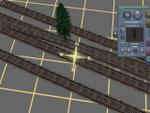| |
| Articles |
Tutorials
| To-Scale Switches and Slips (part.2), by Dr. Norbert Aust (Switchdoc) |
| Read | Write comments: 10 |
Posted Sun May 04 2003 4:02pm |
Page:
1
2
3
4
5
|
To-Scale Slips
This article here is the second part of one big tutorial about switches and slips. So to fully understand the method I recommend you read part one about switches first. There are some basic thoughts and considerations given to some detail that are essential to utilize the method described here.
5) Single and Double Slips
When we connected the two splinepoints between traffic and connecting track during construction of pur first switch we allready created a single slip. If we would not have deleted the piece of track to the left down it would still be existing. So the design procedure of slips does not bear any big difference to designing switches. We will just observe some additional ideas with respect to the position of the splinepoints.
Double slips provide some fuzzy delicate work, for we have to bring in more connections in closer space and placing the splinepoints directly on the final position is not possible. But this can be dealt with in the end.
At first, we start the same as with switches, laying down traffic and connecting tracks in case this did not happen before, as is the case here. And same as before, we mark the point of intersection with a pinetree, once again placed exactly onto one of the points of intersection (Fig.20).

fig.01
Some remarks on design of slips:
Only slips with radius of 190 m have points placed within the qaudrangle formed by the four points of intersection of the rails (in Germany, maybe somewhat different in other countries). Bigger radius ones don't, their points are outside of this quadrangle. But we would have great difficulty to build such a thing in Trainz, especially fixing the drives, in a somewhat confined situation. Thats why I allways build slips with points within - even if this is a little different from reality and gives some smaller radius - but who of the future sepectators really has this knowledge ??
For a double slip we have to introduce four additional splinepoints to introduce two additional arcs. Every two of the splinepoints are very very near to one another. Because I cannot handle this directly I place two new splinepoints inside of the quadrangle, two outside and move those two into their proper position in a second step.
|
|
|
|

